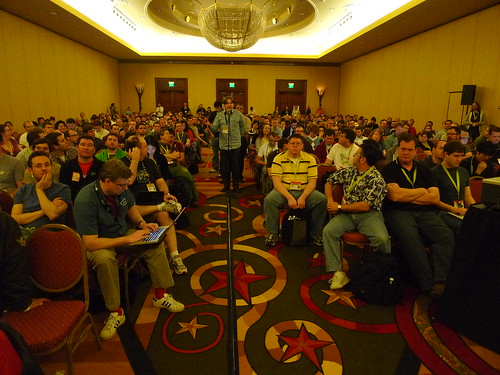Browser wars: the platform wins

Panel: Arun Ranganathan (Mozilla), Chris Wilson (Web Platform Architect, Microsoft), Brendan Eich (CTO, Mozilla Foundation), Charles McCathieNevile (Chief Standards Officer, Opera Software), Darin Fisher (Software Engineer, Google)
Browser experts from Mozilla, Google, Microsoft, Opera, and the Webkit project are all here.
Google wanted to create an open source browser and not build a brand new rendering engine. Webkit was a no-brainer choice for rendering engine because lots of people were using it for many different things. Gecko is a full platform for building applications, so it's too big.
With the decline of Internet Explorer 6, there is no real single browser majority engine, so the platform wins. One area that we can all work together on is standards.
Many of the things you can do with Silverlight are the same things we are trying to do with HTML 5. Why is Microsoft making these things so proprietary though?
We need to build a marketplace where all these companies can make a browser and none of them have the same stranglehold over the market that Adobe has over Flash, or Microsoft has over Silverlight. But these monopolies have made the market more interesting.
How are web standards actually made? Like sausage, you don't wanna know.
There is a problem making these standards, says Javascript creator Brenden Eich. But we are working to make the web better.
It's really about Javascript. It's the defacto programming language of the web. Safari's new beta browser scores a perfect on the Acid 3 test. Every browser actually has a great JS rendering engine, so what else is there to do? Teach people how to write good Javascript so the browser doesn't have to work as hard.
Beyond performance, people are building great big piles of code in Javascript. In the standards body for JS, we are trying to get everybody to cooperate and make material improvements.
We are taking Javascript seriously. With IE8 in particular, we've not only focused on JS performance, we are more worried about holistic performance and user interface," said Microsoft IE guy Chris Wilson.
Google's response to security is to give no access to things like the filesystem, and completely separate user actions and backbone operations. The latest version of Chrome and Safari has support for the origin header.
I am confident that the browser wars will keep going for many years, but at least these companies are working together.
The web browser is the platform now. If your computer isn't connected to the Internet, what do you even use it for? You can do anything inside the browser. Personally, I think the next battlefield will be mobile. Everyone has a phone, but not everyone has a computer. Let's work on making a mobile browser that's standard.


